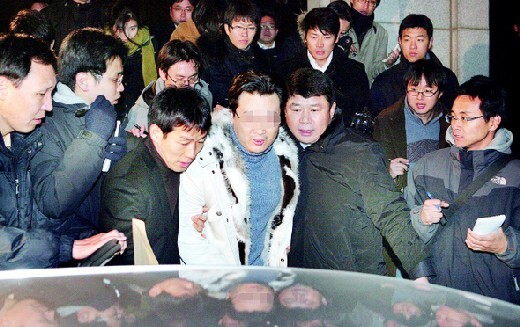hankyoreh
Links to other country sites 다른 나라 사이트 링크
Lack of evidence in Minerva arrest incites public debate

A Seoul court issued an arrest warrant Saturday for a man suspected of being the controversial Internet pundit “Minerva,” whose criticism of the government in writings posted on the Internet over the past year have gained a steady following among the Korean public. The prosecution’s decision to arrest the suspect has caused a heated debate because the arrest warrant was issued before the prosecution had completed its investigation into allegations that the Internet posts were based on false information.
The individual, identified by the surname “Park” was arrested on charges of spreading false rumors on the Internet, with his writings characterized as having “the goal of harming the public good.”
Park is suspected of posting over 200 pieces of writing to the online debate site Agora, a section of the Internet portal Daum, the nation’s second largest portal site. The prosecution believes the posts had a negative influence on the nation’s foreign exchange markets and sovereign credit rating.
Prosecutors are focusing their case on two posts, one from July 30 and one from Dec. 29. In the July 30 post, Minerva wrote that the government was planning to suspend trading of its foreign currency reserves beginning Aug. 1. In the Dec. 29 post, Minerva wrote that the government sent urgent letters to major local financial institutions instructing them to stop buying U.S. dollars so as to slow the won’s fall in value against the greenback.
The prosecution said the July 30 post was based on “totally false information.”
According to the Finance Ministry, however, trading of its foreign currency reserves was partially suspended in August and came to a complete stop in the following month. The July 30 post prompted some media outlets to report that the overall supply of, and demand for, the nation’s foreign currency reserves was on the decline.
Sohn Byung-doo, director of the Finance Ministry’s foreign exchange market division, said, “I don’t understand why the prosecution took issue with the July 30 post, because the information about the foreign currency trade suspension was not false at all. Sohn added that the suspension was carried out not because of declining foreign reserves, as Minerva had predicted, but because of the losses that could be incurred by local banks. But Sohn also said the prosecution “could be taking issue with the repercussions of such an argument.”
The Dec. 29 post has also caused controversy. That post said the government had sent official letters to seven financial institutions and major corporations, instructing them to stop purchasing dollars to curb the won’s further fall in value against the greenback. It has not yet been confirmed whether the government sent the letters, but it was confirmed that the government asked several companies in the private sector for help with lowering the overall won-dollar exchange rate on Dec. 30.
Lee Seok-hyun, a lawmaker with the main opposition Democratic Party who is on the parliamentary committee for national policy, made a statement on Sunday, claiming he had confirmed through multiple sources that the government had actually convened a meeting on Dec. 26 at which it asked the executives of major banks to refrain from generating an overly large demand for dollars.
Please direct questions or comments to [englishhani@hani.co.kr]
Editorial・opinion
![[Guest essay] The real reason Korea’s new right wants to dub Rhee a founding father [Guest essay] The real reason Korea’s new right wants to dub Rhee a founding father](https://flexible.img.hani.co.kr/flexible/normal/500/300/imgdb/original/2024/0423/8317138574257878.jpg) [Guest essay] The real reason Korea’s new right wants to dub Rhee a founding father
[Guest essay] The real reason Korea’s new right wants to dub Rhee a founding father![[Column] ‘Choson’: Is it time we start referring to N. Korea in its own terms? [Column] ‘Choson’: Is it time we start referring to N. Korea in its own terms?](https://flexible.img.hani.co.kr/flexible/normal/500/300/imgdb/original/2024/0423/3617138579390322.jpg) [Column] ‘Choson’: Is it time we start referring to N. Korea in its own terms?
[Column] ‘Choson’: Is it time we start referring to N. Korea in its own terms?- [Editorial] Japan’s rewriting of history with Korea has gone too far
- [Column] The president’s questionable capacity for dialogue
- [Column] Are chaebol firms just pizza pies for families to divvy up as they please?
- [Column] Has Korea, too, crossed the Rubicon on China?
- [Correspondent’s column] In Japan’s alliance with US, echoes of its past alliances with UK
- [Editorial] Does Yoon think the Korean public is wrong?
- [Editorial] As it bolsters its alliance with US, Japan must be accountable for past
- [Guest essay] Amending the Constitution is Yoon’s key to leaving office in public’s good graces
Most viewed articles
- 1[Guest essay] The real reason Korea’s new right wants to dub Rhee a founding father
- 2Terry Anderson, AP reporter who informed world of massacre in Gwangju, dies at 76
- 3[Column] ‘Choson’: Is it time we start referring to N. Korea in its own terms?
- 4Why Korea shouldn’t welcome Japan’s newly beefed up defense cooperation with US
- 5[Column] The clock is ticking for Korea’s first lady
- 6Opposition calls Yoon’s chief of staff appointment a ‘slap in the face’
- 7New AI-based translation tools make their way into everyday life in Korea
- 8[Editorial] Japan’s rewriting of history with Korea has gone too far
- 9[Reporter’s notebook] Did playing favorites with US, Japan fail to earn Yoon a G7 summit invite?
- 10[Column] The president’s questionable capacity for dialogue